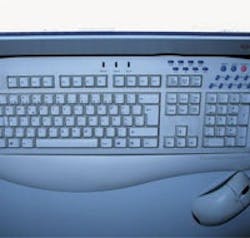PCs Don't Always Feel the Love
PC-based control has made significant inroads into machine and robot automation, but not so much into real-time process control. Legitimate technical reasons for this have evaporated over the past few years, so why are PCs still a relative rarity in process control? "Whether deserved or not, PCs have a reputation for being less robust and more prone to crash or have other disruptions than purpose-built controllers," says Ben Mansfield, marketing manager, PlantPAx process automation system, Rockwell Automation (www.rockwellautomation.com). Of course, process manufacturers commonly deal with production processes that aren't easy to start up and are neither easy, nor economically feasible, to shut down. Safety is also a consideration, so the belief that a PC-based controller might lead to an untimely, ungraceful or unsafe shutdown drives many process manufacturers to choose a purpose-built controller."
He adds, "When security software is installed on a PC whose primary responsibility is maintaining control, the results may be unpredictable. What happens when virus definitions automatically update or a refresh of the in-built firewall policies inadvertently blocks some critical communications path?"
Processes are frequently more sensitive to interruptions than machine operations. "By its very nature, a continuous process has a greater potential for lost product caused by system failure," observes Dr. Alireza Haji-Valizadeh, general manager and technology development director at ControlSoft (www.controlsoftinc.com). "The key issue is reliability of the control system. If a robotic system fails, only the part that the system is working on will probably need to be scrapped. If a process control system fails, the entire batch or process line production will probably need to be scrapped, with possibilities for widespread consequences."
PC-based control is perceived as less reliable, but there are two sides to that debate. "PC-based control should be at home in both the machine or robot control and the process world," says Bjoern Falke, product marketing manager for control and software products at Phoenix Contact (www.phoenixcontact.com).
"Both require control and visualization, a task that an industrial PC can handle with ease. Industrial PC hardware has become very rugged. High shock and vibration specs, increased temperature ranges and non-rotating mass storage, such as solid state drives, make them as rugged as a traditional PLC and suitable for all industries," he adds.
Many associate PCs with Windows and, thus, rightly fear crashes and bugs. But, modern PC-based controllers instead rely on other operating systems, either off-the-shelf embedded solutions, such as Linux or XP embedded, or proprietary, vendor-developed software.
In either case, reliability is greatly increased. "For critical control tasks, we provide real-time operating systems and software," explains Todd Dobberstein, lead product manager for National Instruments' industrial embedded segment (www.ni.com). "Also, a lot of our customers are using field-programmable gate arrays (FPGAs) along with high-performance processors, and running their most time-critical algorithms in hardware on the FPGA for the ultimate in reliability."
However, legitimate concerns remain, particularly in the area of backup control. "Applications that don't require processor redundancy, which is bumpless transfer from a primary to a secondary controller, are ideal for PC-based control," says Joe Ottenhof, regional manager for Beckhoff Automation Canada (www.beckhoff.com). "Within a DCS, a single-loop controller and some PLC-based systems, there's a layer of software that insulates the user from true programming, so establishing functionality is more the result of configuration than programming.
Configuration provides a much more structured environment that minimizes the potential for controls design mistakes. Within a PC-based control system, on the other hand, controls design is free and open by design."


